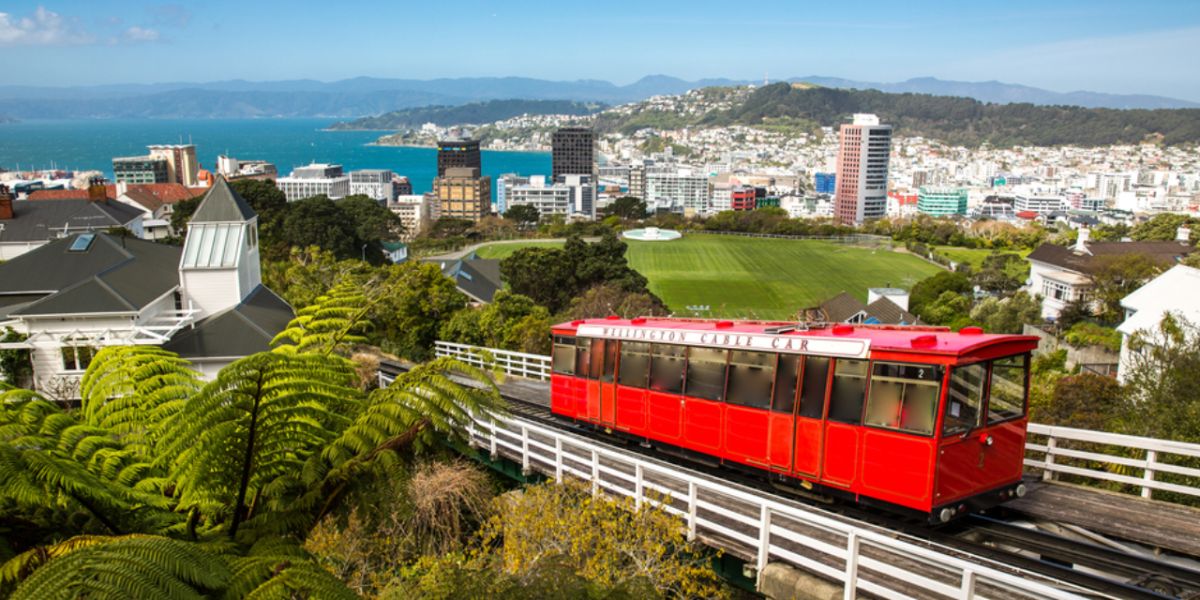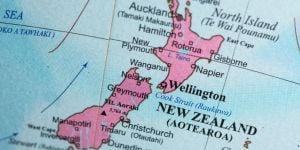
New Zealand's capital Wellington is home to a wide range of things - the Government (located in the famous ‘Beehive'), a well-known coffee culture, and Peter Jackson's Weta Workshop - where films like The Lord of the Rings were filmed. Throughout the city, you will spot movie crews and maybe even a Hollywood star - Wellington is often referred to as ‘Wellywood'.
Wellington has a unique location, with the city center nestled between Mt Victoria (a great day climb!) and Oriental Bay. Welly - as it is known to Kiwis - is also the home of the Interislander and Bluebridge ferry terminals, which bounce back and forth across the Cook Strait to the South Island. Wellington tends to have more windy days than sunny days and tends to have a cooler, rainier climate than the rest of New Zealand during summer.
Wellington's “livability”
According to livability indexes, Wellington ranks highly in terms of stability, healthcare, culture and environment, and education. It also has a very low crime rate compared to other cities. In fact, in 2021, The Economist Index named Wellington the fourth most liveable city on earth.
One of the things that makes Wellington a particularly livable city is its compact size. The city center is small and easy to navigate, and it's easy to get around on foot or by public transport. This means that you don't have to rely on a car to get around, which can be a significant advantage in terms of cost and convenience.
Wellington is also known for its lively arts and culture scene, with a range of festivals, events, and museums to enjoy year-round, although the summer is an especially vibrant time for outdoor events. The city is home to a number of world-class restaurants and cafes, as well as a range of outdoor activities on your doorstep, including hiking, mountain biking, and water sports.
Overall, Wellington is a popular destination for both tourists and residents, and it's easy to see why. With its attractive location, high quality of life, and vibrant culture, it's a great place to live. Now you just have to figure out which neighborhood best suits your needs!
Neighborhoods in Wellington
Wellington is very hilly, and if that's not bad enough, it is also prone to earthquakes. More modern buildings have been earthquake-proofed, but older houses may not be. Rental properties in Wellington can be hugely variable, from modern apartments to old wooden villas. There are rural options in the outskirts of Wellington, modest suburban homes in the outer suburbs, studios and compact units near the CBD. Basically, the rental market is quite diverse, though some neighborhoods will have their own character and general trends in housing style. To get a good sense of what kind of rental properties are available in Wellington, we recommend looking at TradeMe, which is a great introduction to the style, size, and general aesthetic of New Zealand homes.
Some of Wellington's notable neighborhoods are:
- Brooklyn - Up one of the big hills, south of the CBD, perches village-like Brooklyn. With its many cafés and famous art deco Penthouse Cinema, it is a nice place to spend an afternoon or evening. It is also home to nice parks and Wellington's Wind Turbines, which are worth a visit for the view.
- Miramar - Just past the airport sits beachy Miramar on its own little spit of land. It has been the home to Wellington's film industry since before World War II and is currently home to Peter Jackson's Weta Workshop and Studio.
- Mount Victoria - At the base of Wellington's best-known viewpoint lies the Mount Victoria neighborhood. It is very residential and easily walkable to the CBD while also on the doorstep of a great forest hike, where you are rewarded with the best views of the city. Mount Victoria is also a popular filming spot, as it was used for the Hobbiton Woods, as well as Elliot's home in Pete's Dragon.
- Oriental Bay - If you continue to walk along the harbor, you will eventually come across this seaside suburb. Oriental Bay boasts bars, restaurants, and houses, almost all with sea views, as well as a popular beach swimming area and famous fountain.
- Petone - A proper suburb that is a drive or commuter train ride away, Petone is a charming little area with a nice high street of shops, its own beach and seafront café, and more affordable detached villas and bungalows.
- Te Aro - Perhaps Wellington's most happening and most central area, Te Aro is home to the shopping, foodie, and nightlife haven that is Cuba Street and the bars and restaurants of Courtenay Place. There are multiple cinemas within less than a 1km radius, from the arty Lighthouse Cinema and Embassy Theatre to the more commercial Reading Cinema. Te Aro is adjacent to the CBD, making it easy to walk to work.
- Thorndon - One of the more historic neighborhoods, Thorndon is a great base for government workers as it is where Parliament, most international embassies, and many ministries are located. It is also home to the Westpac Stadium.
- The Hutt - Just past Petone is Lower Hutt, and beyond that is Upper Hutt. These are commuter suburbs, made up mostly of housing estates with only small areas of shops and takeaways near the train stations. You can get many more houses and gardens for your money out there, though, and the train journey is quite pleasant as it goes along the seafront into the CBD.
Renting accommodation in Wellington
Because of all the great qualities we've discussed above, demand for rental properties and homes in the city is generally high, which can drive up prices. The average rent for a one-bedroom apartment in Wellington is around NZ$500 per week, while the average rent for a three-bedroom house is around NZ$700 per week. However, prices can vary significantly depending on the location, size, and condition of the property. For example, rent for a one-bedroom apartment in the city center will generally be much higher than in a suburban area. You can use the Tenancy Services website to determine what standard rental prices are in your area to determine if you are paying a fair price.
Leases in Wellington
If you end up renting a place in Wellington, the conditions of your rental will be laid out in your lease. Here are the basics of what you can expect in a typical New Zealand lease agreement:
- Rent: The main condition – the lease will state how much rent you will be paying (and how often) to your landlord or property manager.
- Term: The length of time you'll be renting the place, which can be anywhere from a couple of months to several years, depending on your needs and the landlord's preferences.
- Bond or security deposit: Before you move in, you'll need to pay a deposit to cover any damage or unpaid rent when you move out. So long as you don't trash the place, you should get this back!
- Inventory: This is a list of all the things that are included in the property, like appliances, furniture, and fixtures. You'll need to check this list to make sure everything is in good condition before you move in and again when you leave.
- Maintenance and repairs: If something goes wrong while you're renting the place, it's usually the landlord's job to fix it. That being said, you should still keep the place clean and tidy and report any issues as soon as possible.
- Termination: If you need to leave the place early or want to end the lease at the end of the term, there's a process for that. Just make sure you give your landlord enough notice so they can find a new tenant.
Remember, before you sign anything, make sure you read and agree to all the terms and conditions in the lease agreement. If you're not sure about something or think the terms are unfair, don't be afraid to ask questions or get help from Tenancy Services.
Buying property in Wellington
In general, only residents and citizens can buy residential properties in New Zealand, though the New Zealand government has developed a tool to assess what you may be able to purchase. If you are on a resident visa in New Zealand, you should be able to purchase a property.
The average house price in Wellington is currently around NZ$850,000, which is significantly higher than the national average of around NZ$700,000. However, prices can vary depending on the location, size, and condition of the property. For example, a house in the city center or in a desirable suburb may be more expensive than a house in a less desirable area.
In recent years, rent and house prices in Wellington have increased significantly, driven by strong demand and limited supply. However, as of 2022, house prices are experiencing a dip.
Still, prices are still very high when compared to international housing markets, but there are steps that you can take to help you find a rental property or home that fits your budget.
The best place to look would be Trade Me, even if you are still overseas. Once you have arrived in New Zealand, get in touch with some real estate agents, and they will be able to help you out. When you first arrive in Wellington, your best options will be Airbnb or extended stays in hostels or hotels while you get a feel for the city and figure out where you would prefer to be based.
If you are committed to buying property in Wellington, there are a few steps to follow. We've broken down the process, from research to transfer of ownership, into six basic steps:
- Step one: Do your homework. Dive into the local housing market and get a feel for what you can afford based on your budget.
- Step two: Make sure you have the budget. Most Wellingtonians finance their home through banks. Talk to a money expert or mortgage broker to iron out the nitty-gritty details of your loan and work out exactly how much you can spend.
- Step three: Think about hiring a lawyer. Buying a property can be very complicated, especially if you're in a foreign country, so consider hiring a lawyer to help you out with all the legal technicalities.
- Step four: House hunt! Get online and browse through house listings, and go to open homes. We recommend using a real estate agent to help you find the perfect pad.
- Step five: Inspect the goods. Before you get in too deep, you'll want to make sure the property is in good condition. Get a Land Information Memorandum (LIM) report, an engineer's structural report, and a final valuation to make sure you're not getting ripped off.
- Step six: Make your move. When you've found the one, make an offer or participate in an auction. Once you've agreed on the sale terms, sign a legally binding Sale and Purchase Agreement, transfer the ownership of the property, and transfer the money to the seller.
We do our best to provide accurate and up to date information. However, if you have noticed any inaccuracies in this article, please let us know in the comments section below.








